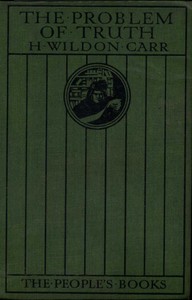| Summary |
"The Problem of Truth" by Herbert Wildon Carr is a philosophical treatise written in the early 20th century. This work delves into the fundamental questions of truth and knowledge, exploring different philosophical theories and their implications, particularly focusing on pragmatism and idealism. Carr seeks to clarify the nature of the problem of truth, arguing that it has both historical roots and contemporary significance, while also indicating his own leaning towards the insights of Bergson. The opening of the volume outlines Carr's essential argument that truth is not merely a simple property of statements, but a complex philosophical issue intertwined with our understanding of reality. In the beginning chapters, he contrasts the approaches of physics and metaphysics, suggesting that both sciences and philosophy reveal increasing complexity when the simplest notions, like truth, are scrutinized. Carr points out the historical backdrop of the problem of truth, noting its enduring nature from philosophers like Protagoras to contemporary debates among intellectuals today. He aims to navigate readers through the existing philosophical terrain, positioning his perspectives on how truth may ultimately be understood through the lens of human experience and inquiry. (This is an automatically generated summary.)
|

